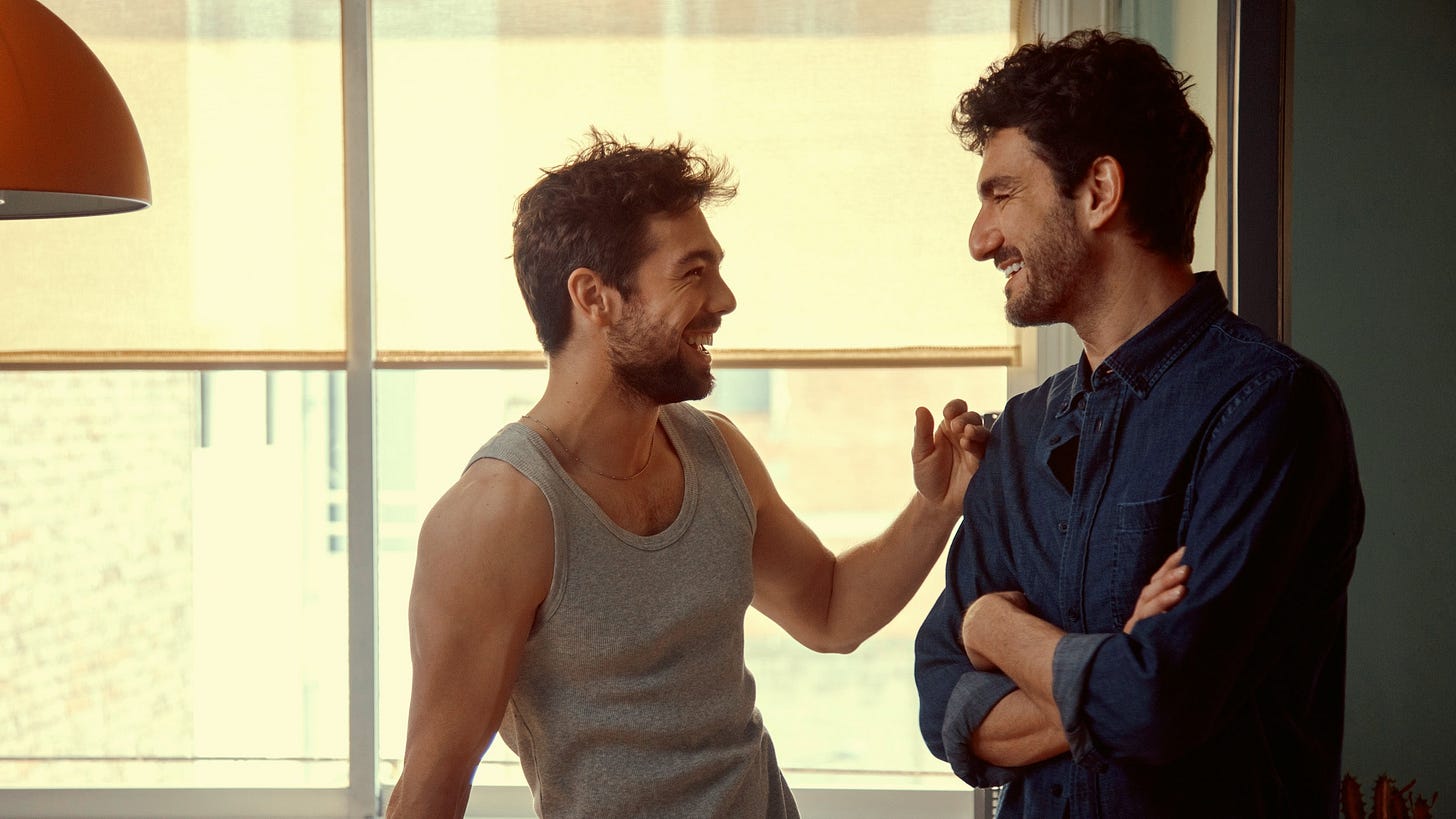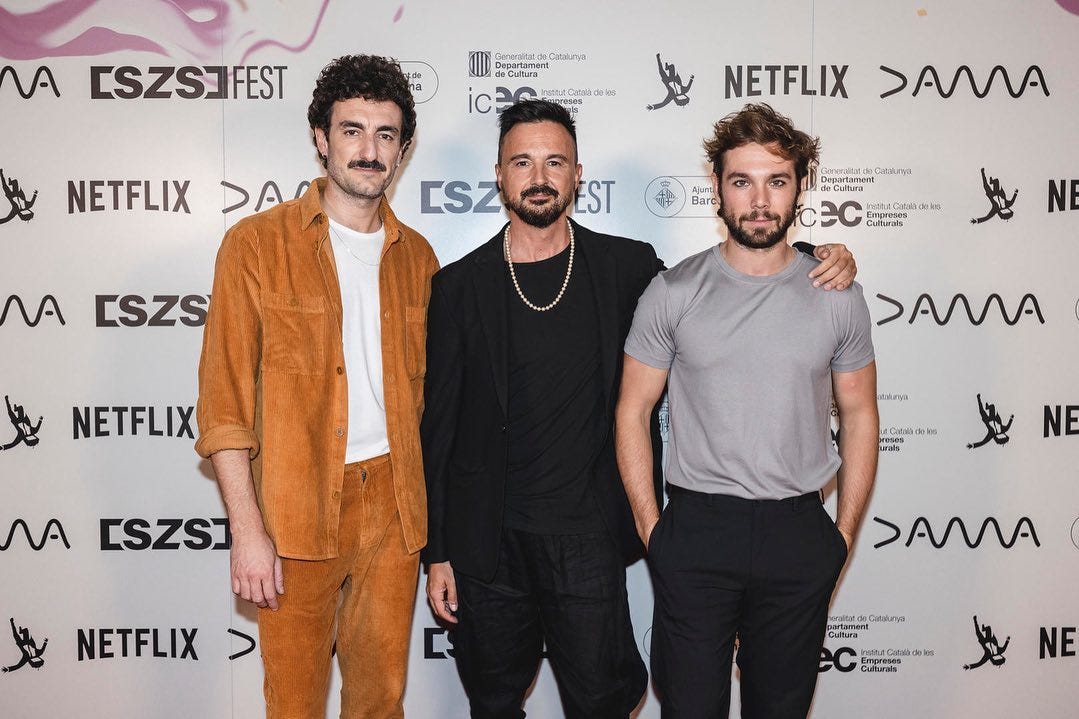The Greatest Love Story of My Life Isn't Real
When I wrote 'Smiley' for the stage, I didn’t know I’d end up in a throuple with my characters Alex and Bruno that would prove impossible to escape.
Each week, The Queer Love Project publishes an original essay. Want to submit your essay and add to our growing archive? Find our submission guidelines and more here.

Twelve years ago, a love story changed my life forever. That's what we always ask of love stories, right? That they shake our world, transform us, become unforgettable, stay with us for the rest of our lives. Mine was one of those stories. And the best part is—it hasn’t ended yet. You could say I'm lucky to have had the chance to experience that at least once in my life, but there's a small problem: I didn’t live that love story. I only wrote it. It's called Smiley, and you can watch it on Netflix.
Yes, the most important love story of my life is fictional. By saying this, I’m not devaluing the relationships I've had. All of them have shaped my life in one way or another. I’ve grown, learned, suffered, laughed, cried, sweated, and bled with them, but I can't say they had the same impact in my life as Smiley. And sometimes I’m terrified by what that may actually mean about me.
My sexual awakening came late: back in the early ‘90s, pre-Olympics Barcelona that was nothing like the LGBTQ+ paradise it’s become. The closet I had to come out of was crammed with cassocks and Catholic catechism books. During most of my adolescence, sex in all its forms—not just homosexual coupling—was inconceivable, and a complete lack of sexual education meant I didn’t know how to manage my erections to the point where I didn’t discover the noble art of masturbation until I hit 17.
University changed everything drastically. By 19, I had a queer group of friends; by 20, I had my first boyfriend; and at 21, I had the chance to live in London on an Erasmus scholarship. There, intoxicated by youth and freedom, I found my identity as a gay man. Upon returning home, the first thing I did was come out to my family. Everything was as liberating as the clichés demand, and three years later, I began a relationship with a man 14 years my senior. I ended up living with him for half a decade.
I remember that relationship fondly. I’m now aware that I wasn’t so much looking for a partner as I was seeking an older mentor to reflect upon and learn from, a sort of gay godfather: masculine, experienced, well-established, traditional... basically everything I wasn’t and wanted to be. I was happy during those five years of monogamy, but the relationship was based on an evident imbalance that eventually adopted some teacher/student dynamics (a.k.a. daddy issues) that could no longer continue once I’d earned my degree as an adult gay man.
And so began 20 years of singlehood. I define it this way because, during that time, I didn’t have a relationship deep, long, and meaningful enough to consider any of the men I shared love stories with as a true partner. Obviously, during those two decades, my relationship with love hasn’t always been the same. In the first years after my breakup, I made a conscious decision not to get into any relationships and to fuck as much as possible. I consciously avoided commitment to the point where I prioritized sexual encounters with tourists to ensure there was no possible future. During that time, I was only seeking sexual validation, and that was enough.
I had fun, of course, but I eventually got tired of it. The years of easy sex, clubbing, dark rooms, and nameless dicks in my thirties were necessary to make up for the experiences I felt I missed in my twenties. They were a rebound effect in response to five years of monogamy, but the kinetic energy of that libido blast soon ran out. I started missing having a partner. And since the only thing I had known until then was monogamy, I went back to seeking that: I opened the door to my heart a little and peeked out to see who was out there.
I didn’t let many men in, but they had something in common: They all were wrong choices. Some mistakes were theirs, and many others were mine. Fear, expectations, deception, misunderstandings, self-sabotage, insecurities—the reasons why those seeds didn’t take root are innumerable. I’ve managed to decipher some of them years later, and they were mostly in my own head, while others were clear from the beginning (I got involved with several toxic jerks). But when I was nearing 40, I started reaching a worrying conclusion: I couldn’t manage to have a stable relationship. What was happening?
At that moment, I made two important decisions: to start therapy and to write a play that talked precisely about that addressed my relationship conundrum. And that’s how Smiley was born. The play tells the story of Alex and Bruno, two completely different gay men who fall in love even though they can’t stand each other. It’s a classic “enemies to lovers” between two characters who were, deep down, both myself: on one hand, the superficial circuit boy addicted to the gym, and on the other, the romantic intellectual with a heart bigger than his biceps. The piece also aimed to be a tribute to classic rom-coms, from Howard Hawks to Nora Ephron. With that goal in mind, I gathered all the clichés of the genre, all the tropes we all grew up with and have shaped our society’s heterosexual sexual-affective imaginary from the big screen, and used them to tell a love story between two men who long to fall in love to give meaning to their lives.
The play was an instant success. Smiley ran for three years in Barcelona, then premiered in Madrid, and in the following years, it has been seen in over 30 countries and counting. In 2022, executives at Netflix asked me to turn the play into a series, allowing me to expand the universe of Alex and Bruno to tell other queer love stories, this time for the whole world to see.
In other words, while I was striving to build my own love story, Smiley began to grow and take on a life of its own. I had used the scraps of my own failed relationships to build another up, in this case fictional, that would end up reaching millions of people and, at times, touching the souls of some, inspiring others, and giving hope to many more. Since then, I have received messages from people who tell me how important Smiley has become in their lives; how they took their parents to the theater before coming out to them; how they saw it with their current partners on their first date; or how it helped them believe in love again after years of disappointment. Paradoxically, my romantic failures were allowing others to find what I was still looking for.
And things didn’t get better. The international success of Smiley was inversely proportional to my romantic success. At the time, my friends weren’t exactly helpful: “How is it possible that you, of all people, who know so much about love, don’t have a partner? You must have men lined up with bouquets of flowers at your doorstep! I’m sure the ideal man will appear soon! Could it be that you’re too picky?” None of those lines—which may or may not have been said in Sex and the City—helped me. On the contrary, I began to question my own worth as a potential partner, to think that there was something intrinsically flawed in me that prevented someone from loving me, and I ended up becoming the kid who, tired of losing at soccer, takes the ball home so no one else can play.
It took some time, but therapy helped me realize what was happening. The worst thing you can do to a new partner is compare them to an ex you were happy with. No relationship can survive the ghost of a fulfilling relationship. But I wasn’t comparing my love life to any past relationship. I was doing something much more harmful: comparing it to what I thought it should be. The kind of love I had portrayed in Smiley.
I realized that by using the narrative mechanisms of classic rom-coms, I had written an idealization of romantic love that, no matter how successful it was and how much it was making people happy, was making me feel more and more miserable. The standards of romantic comedies are unattainable. Using them as a reference for a healthy relationship is as effective as comparing your sex life to a porn movie or trying to achieve Chris Hemsworth’s physique without steroids. And that’s exactly what I was doing.
Realizing this was liberating. It allowed me to learn not to judge myself so harshly, to treasure other kinds of love beyond the romantic version, and to question whether I really need a monogamous relationship to be happy. But Smiley was still there (and still is), and I had to do something about it.
So in 2020 I wrote Smiley: Life After Love. The play is a sequel that takes place eight years after the events of the first part, and again under the disguise of a classic rom-com—in which [SPOILER ALERT!) Alex has to stop Bruno from marrying someone else—I tried to deconstruct the paradigms of romantic love, giving the characters an unexpected ending that avoids the clichés of the genre, but is more in tune with a multifaceted and less rigid idea of what it means to love each other.
Writing that second part freed me from the chains I had imposed on myself with the first one. Or maybe I was able to write it because I had already freed myself from them. The chicken and the egg, you know how it goes.
The sequel was a success in Barcelona and will begin its international journey in November in Santiago de Chile. Unfortunately, the Netflix series won’t explore that future, as there won’t be any new seasons, but I hope Alex and Bruno's story continues to live on stage for many years to come.
So yes, you could say that Alex and Bruno's love story has been the most important of my life and that this strange threesome I have with them will continue to work in the future. Right now, I don’t know if there will be room for a fourth character, someone to call a partner with whom to share my life. The door is still open, without the hormonal urgencies of my thirties or the toxic, unattainable ideals of my forties, so maybe my fifties will bring something new.
Whether it happens or not, the only sure thing is that Alex and Bruno will be there to help me tell my story. The idea of writing a third installment of Smiley in a few years is growing in me as I realize that maybe I’ve reached a point where I can't figure out my own relationship with love without them. I don’t know what the plot is going to be about or whether it will have a happy ending. But hopefully this one will actually make me smile.
Guillem Clua is a Spanish playwright, screenwriter, and director recognized for his dynamic and often provocative works. Born in Barcelona, Spain, he’s garnered a reputation for his modern and innovative storytelling, often blending elements of various genres and media. His work has received important awards, including the National Award of Literature given by the Spanish Government in 2020.
Throughout his career, Clua has explored a wide range of themes, including political issues, social conflict, and LGBTQ+ stories, often infusing his works with sharp wit and emotional depth. Some of his most acclaimed plays include Skin in Flames, Marburg, The Swallow, and Smiley, each of which has received critical acclaim and has been performed internationally.
Clua's ability to navigate complex narratives and his willingness to tackle challenging subjects have established him as a significant voice in contemporary theatre. In addition to his work in the theater, Clua has also made notable contributions to television and film, further showcasing his versatility as a writer and creator. He has written original scripts for the screen, as well as adaptations of his own work, that include the hit Netflix show Smiley.







A very intimate and personal essay from the creator of the wonderful play and Netflix show "Smiley." Nice to see the man behind the story.